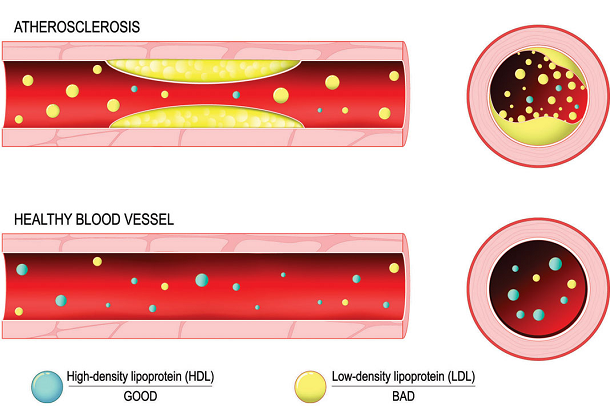What is cholesterol and what is its role?

What is cholesterol?
The biggest influence on blood cholesterol levels is the mixture of fat and carbohydrates in the food, not the amount of cholesterol we eat in the food.
Although it is important to limit the amount of cholesterol we eat, especially if we have diabetes, most people’s intake of cholesterol is not as problematic as we think.
Cholesterol is the starting point for our body to make estrogen, testosterone, vitamin D, and other vitamin compounds.
Cholesterol in the bloodstream, especially bad LDL cholesterol, is one of the most important factors in determining health risks.
How does fat get into the bloodstream from food?
Fat and cholesterol do not dissolve in water and blood. Instead, our bodies make fat and cholesterol into small pieces of protein called lipoproteins. Lipoproteins can carry a lot of fat, but they are easily mixed into the blood and flow with the blood. Some of these lipoproteins are large and loose, while others are small and dense. The most important are low density lipoproteins (LDL), high density lipoproteins (HDL), and triglycerides.
Low density lipoprotein
Low density lipoproteins (LDLs) carry cholesterol from the liver to the rest of the body. Cells stick to these pieces and extract fat and cholesterol from them. With too much LDL cholesterol in the blood, these pieces are stored in the coronary arteries and in the walls of other arteries that spread throughout the body. These stores, called plaques, make arteries narrow and prevent blood flow. If the plaque splits, it can cause myocardial infarction or stroke. Because of this, LDL cholesterol is often referred to as ‘bad’ or ‘harmful’ cholesterol.
High density lipoprotein
High density lipoprotein (HDL) finds cholesterol from blood flow, LDL, and arterial walls, and sends it back to the liver to dispose of it. So you can think of HDL as a garbage truck with blood flow. Therefore, HDL cholesterol is often called ‘good’ and ‘protective’ cholesterol 비아그라효능
Triglyceride
Triglycerides make most of the fat that we eat and flow through the bloodstream. Triglycerides, the main means of sending fat from the body to cells, are important for health, and high levels of triglycerides can lead to unhealthy conditions. In general, the lower the LDL and the higher the HDL, the more likely it is to prevent heart disease and other chronic diseases.
How does fat and cholesterol in food affect blood cholesterol levels?
The form of fat in food helps determine the total amount of cholesterol, HDL cholesterol, and LDL cholesterol. The type and amount of carbohydrates in food are also related. Cholesterol in food is also related, but it doesn’t affect much.
About half a century ago, high blood cholesterol levels were found to increase the risk of heart disease, which led to numerous warnings about avoiding foods with cholesterol, especially foods such as eggs and liver. However, scientists’ findings show that a person’s blood cholesterol level is less relevant to the amount of cholesterol he or she consumed during the week.
In a study involving more than 80,000 female nurses, researchers at Harvard University found that eating one egg a day had nothing to do with increasing the risk of heart disease. However, people with heart disease or diabetes should carefully watch their egg intake.
For most people, the amount of cholesterol that the person eats has only a slight effect on the amount of cholesterol that is flowing in the blood. But for some people, the amount of cholesterol that the person eats has a very big impact on blood cholesterol levels going up and down. Avoiding cholesterol-rich foods will have a significant effect on blood cholesterol levels. Unfortunately, however, now there is no other way but to identify those affected by eating cholesterol from those who are not affected.